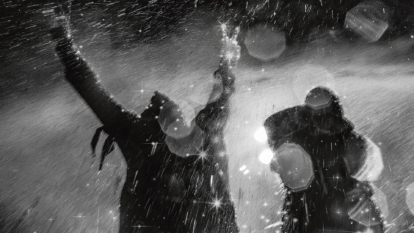Protecting the Right to Protest
All illustrated photos by Josué Rivas. Josué layers illustrations over his film photography to reveal what the eye cannot see in a photographic image alone.
Throughout my 30 years as an environmental activist, I’ve seen more crackdowns on peaceful protestors than I can count. But as the climate crisis deepens, and the voices of those demanding solutions grow louder, I’m more alarmed by the silencing of activists than ever before. In each corner of the country, I know courageous people whose lives have been completely upended for standing up and speaking out about environmental injustices.
In South Dakota, Indigenous activist Nick Tilsen recently faced the threat of 17 years in prison after leading a peaceful protest demanding the return of illegally seized Lakota territory known as the Black Hills—to restore Native rights and protect the lands from further extraction.
In West Virginia, community organizer Alex McKinnon (a pseudonym) was one of dozens of activists sued by a group of fossil fuel corporations for protesting a 300-mile multibillion-dollar pipeline set to cut through the Appalachian Trail.
And in Washington, D.C., attorney Deepa Padmanabha has spent the last seven years defending the legacy environmental nonprofit Greenpeace from a $300 million lawsuit for supporting Standing Rock, the Indigenous-led movement to stop Dakota Access Pipeline.
Nick, Alex and Deepa are very different people: different backgrounds, living in different places and working for different causes. But they have something important in common: Each exercised their First Amendment right to free speech and peaceful protest. And each faced crushing legal consequences for doing so.

Nick Tilsen (center left) and other water protectors cross a handcrafted bridge to Turtle Island, a sacred site and burial ground for the Standing Rock Sioux. Although Tilsen was not charged with crimes related to the Standing Rock protests, he would go on to face the threat of 17 years in prison for protesting former President Trump’s visit to Mount Rushmore, a national US memorial built on stolen Lakota land.
***
In the past few years, corporate interests have been working extra hard to erode the right to do what activists do when they come together to address a problem: speak out, organize, collaborate, raise funds, and when other avenues of democratic participation fail to produce results, put their bodies on the line through acts of nonviolent civil disobedience.
These are all different forms of protest, and all are essential tools in the toolbox of those seeking to prevent the plunder of our planet.
For communities most excluded from decision-making processes, protest is often the only avenue of democratic participation that’s readily available. This is in part why civil disobedience—a tactic that oftentimes involves breaking the law—has helped cement monumental human rights wins for social movements across the world, led by the likes of Martin Luther King Jr., Rosa Parks, and Gandhi.
Protest, whether with words or one’s body, is powerful, not just for the decision-makers challenged, but also for the participants. Historically, state-sanctioned violence against protestors unfairly targets Black, Indigenous, and other people of color—for fellow protestors, this makes the act of solidarity even more important.
“For those of us concerned about the climate crisis, daily life can feel like cognitive dissonance,” activist and actor Jane Fonda told me recently. “It’s when I speak out, when I engage in civil disobedience, when I put my body on the line that I feel like my body and my values are fully aligned. And from that place of alignment, I can better advocate for the change we urgently need.”
I’ve felt that alignment over my lifelong commitment to activism and protest, including the dozens of times that I engaged in civil disobedience. And I’ve seen it play out on a strategic level: For the almost nine years I led Greenpeace USA, protest tactics made each and every single one of our campaigns stronger.
We protest because it works—and it’s precisely because protest works that it is under attack.
***
A primary driver of the crackdown on climate protest is the same driver of the climate crisis: fossil fuel corporations. Rather than embrace the inevitable transition to clean, renewable energy, fossil fuel interests and their allies in government aim to weaken the powerful tool of protest so they can continue to frack, drill and mine unchallenged, without addressing the human and ecological cost of continued extraction.
The systemic attack on peaceful protest takes many forms, including Strategic Lawsuits Against Public Participation (SLAPPs) and anti-protest legislation.
SLAPPs, which Deepa, Alex and hundreds of other environmental activists have faced, are a kind of corporate legal bullying. The meritless lawsuits aren’t necessarily designed to win in court but aim to intimidate, distract, bankrupt, exhaust and silence critics.
Deepa was pregnant with her first child when the initial SLAPP notice against Greenpeace arrived. That child is now 6 years old, and Deepa takes calls on the case while her second is in ballet class. She’ll jokingly call the lawsuit her “first child” as it has taken as much attention as the subsequent two.
Currently, 33 US states have anti-SLAPP legislation, but even with these laws, corporations that SLAPP activists get away with inconsequential fines if anything; whereas activists have years of their lives burdened with bogus but expensive legal proceedings and, in some cases, the possibility of imprisonment hanging over their heads. Often, SLAPP defendants can’t even discuss details with friends and allies, for fear of pulling them into the lawsuit.
“It’s isolating, and it just drags on and on,” says Alex, who sees her activism as a moral imperative, informing how she sees her meaning in this world.
Another measure to silence protests are laws that criminalize constitutionally protected activity or increase penalties for already illegal activities, such as turning trespassing into a felony or adding domestic terrorism charges to the complaint. Since 2017, 44 US states have adopted anti-protest laws (commonly known as Critical Infrastructure Bills), with more than two dozen additional bills pending. These laws, which have been used to target activists like Alex, label fossil fuel and other industrial property as “critical infrastructure” to justify severe crackdowns on protesters.
Many fossil fuel corporations are launching SLAPP suits while lobbying for anti-protest legislation. A 2023 Greenpeace study found that about 75 percent (86 out of 116) of SLAPPs and other forms of legal harassment since 2010 were filed by corporations that helped draft or pass these anti-protest criminal laws. Big Oil and Gas is covering all its bases to try to silence anyone raising the alarm, which is exactly what our movements need to be doing.
***
In December of 2022, after two and a half years of uncertainty for Nick and his family, and an outpouring of public support from around the country, charges against him and his fellow protesters were dropped.
“The fact that I’ve gone from facing 17 years in prison to all charges dismissed is not a coincidence or an act of justice … it’s evidence that the charges were bogus from the start,” said Nick in a public statement. “We won because we had a strong network to fight them and did not back down until we had exhausted the system that was built to exhaust us.”
As of this summer, the SLAPP suits against Greenpeace and Alex are moving forward. This comes amid a Supreme Court decision that grants presidential immunity and as police forces crack down on peaceful student protestors across the country.
Right now, we’re nearing an election with far-reaching consequences on many fronts, including the climate crisis and the right to peacefully protest. As we fill out our ballots in the coming weeks, let’s keep front and center the issues we feel most strongly about. For me, it’s combatting the climate crisis and safeguarding the democratic rights to do so. A healthy democracy is a precondition for a healthy environment; both are on the ballot this November.

